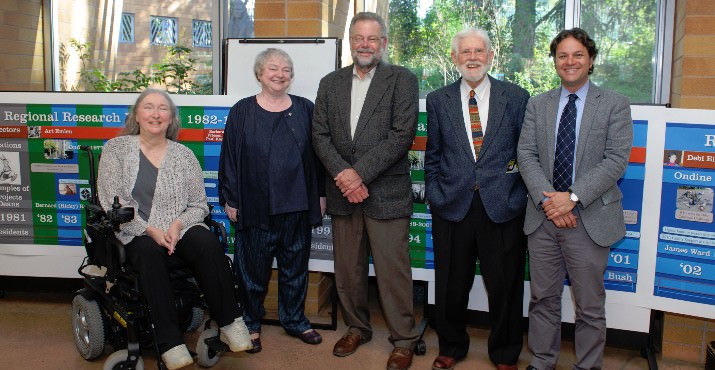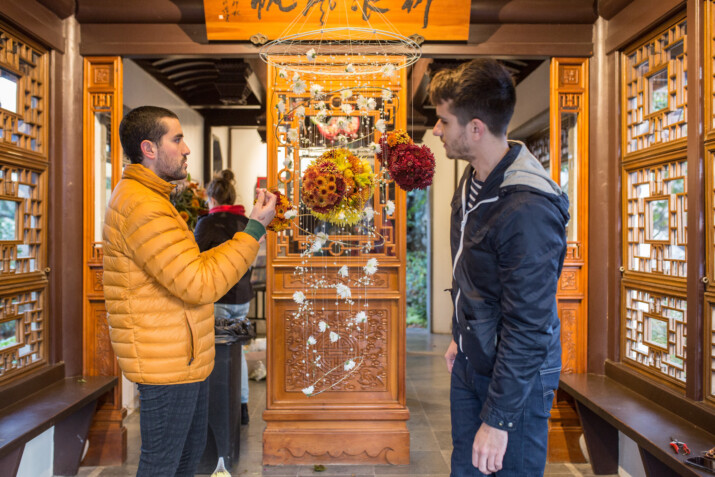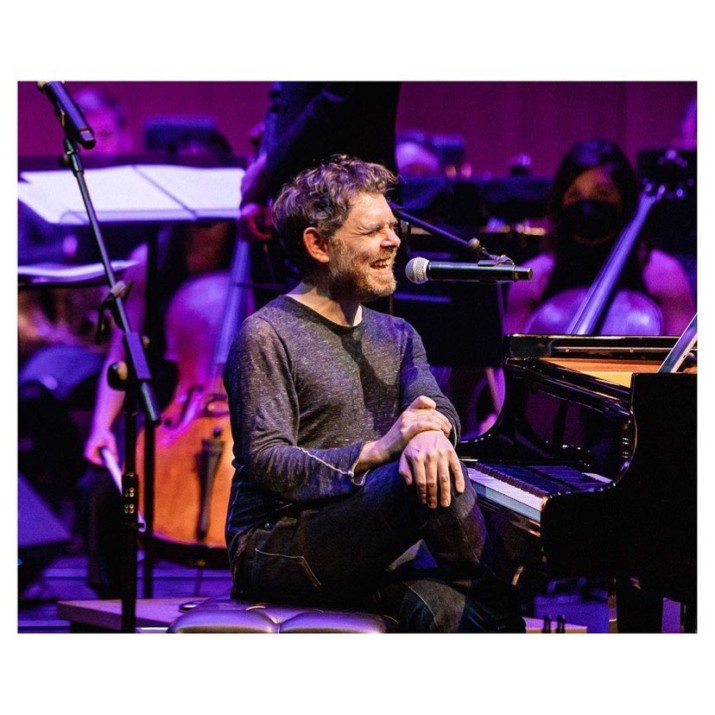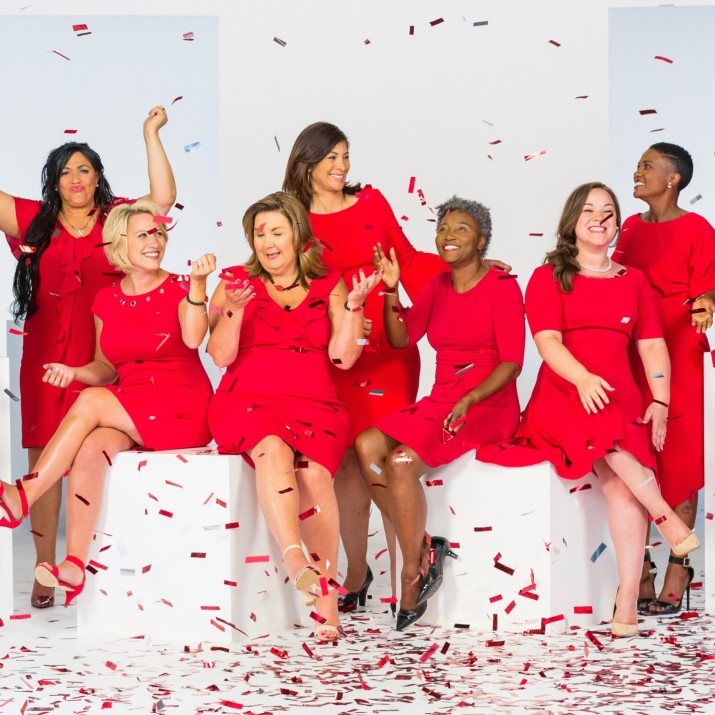Portland, April 10th, 2013. The Portland State University Regional Research Institute for Human Services celebrated 40 years of collaboration with local, state and national partners. An Open House at the Institute was followed by a reception at the Native American Center, attended by 150 community partners, SW faculty. Partnership awards were presented to the Multnomah County Department of Human Services Child Welfare district, The Miracles Club, NAYA Youth and Family Center, and the National Indian Child Welfare Association.
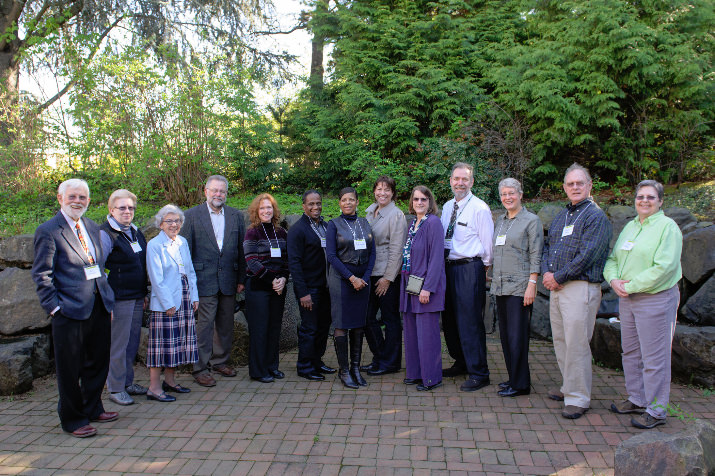
RRI former staff members gather in the courtyard: Art Emlen, Diane Mikkelson, Joan Shireman, Bill Feyerherm, Heidi Herinckx, Herman Bryant, Dionne Preston, Tanya Ostrogorsky, Rosemary Ryan, Lyn Gordon, Kathy Seubert, Robert Bailey, Marilyn McManus.
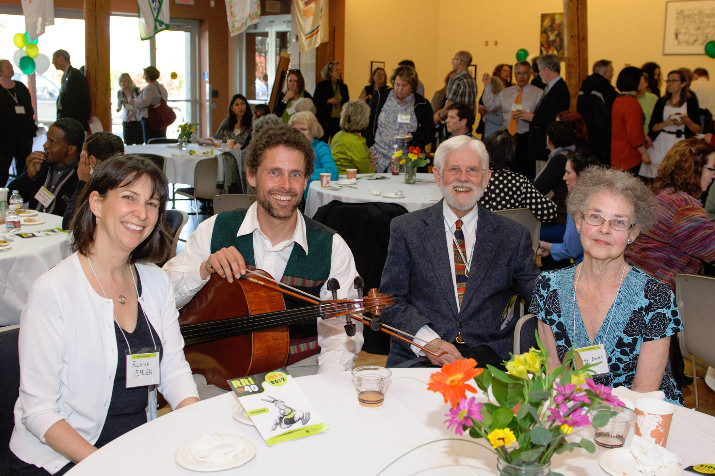
Former director Art Emlen (3rd from left) with family members Elana Emlen, Andrew Emlen, and Bitsy Emlen.

RRI staff Danielle Droppers, with award recipients from The Miracles Club Herman Bryant and Dionne Preston.
About RRI
RRI is the research arm of the School of Social Work at PSU, with a 40 year history of conducting research dedicated to improving the design, management, practice and evaluation of human services and service delivery systems. RRI is the largest social and behavioral research institute on the PSU campus and is home to two large nationally funded Centers.
What we do:
RRI has multiple streams of overlapping and intersecting work, including community-engaged evaluation services, investigator-initiated research, and developmental or systems change work. All of the work at RRI shares common themes and guiding principles. More information about our services and capabilities are availalble on our Research Sevices page.
Community-engaged evaluation and capacity-building.
Historically, the heart of RRI’s work has focused on meeting the needs and addressing priorities of community partners through evaluation services. RRI faculty and staff help partners:
- Develop and evaluate field-initiated demonstration projects in response to federal funding opportunities;
- Conduct process studies of broad system-level initiatives; and
- Undertake evaluations sponsored by state and local entities to understand and improve program effectiveness.
The work is always driven by partnership and collaboration, with RRI researchers helping to meet evaluation requirements that accompany grants and cooperative agreements, while also ensuring that local concerns are addressed. RRI faculty and staff work with partners on program design, facilitate the development of logic models, help identify intended outcomes, develop procedures to monitor fidelity, and create strategies to assess short- and long-term outcomes. Consumers, providers, and stakeholders play an important part in all these activities, and are critical to understanding, interpreting and disseminating results as well.
Investigator-initiated research
A growing portfolio of investigator-initiated studies, funded by the National Institutes for Health (NIH), the Institute foe Education Studies (IES), and other federal sources, focus on advancing knowledge. This portfolio currently includes seven randomized controlled trials (RCTs) testing the efficacy of interventions for youth and siblings in foster care, youth with disabilities, and services for transition-age youth. Research faculty at RRI are partnering on these studies with colleagues at PSU and other institutions around the country, utilizing interdisciplinary strengths and state-of-the art methods. In addition to RCTs, effectiveness research at RRI tests evidence-based practices (EBPs) in community settings, brings EBPs to scale in public systems, and adapts and tests culturally specific models.
Developmental or Systems Change Work: Making things happen.
RRI faculty and staff and their community partners frequently go beyond the boundaries of the traditional research roles to ‘translate’ learning into practice. This may involve development of new interventions in response to research findings, working with underserved populations to adapt or create practice based interventions, developing training programs, giving voice to consumers in advocacy leadership roles, providing consultation and technical assistance to programs and agencies, and convening partners and stakeholders at multiple levels across multiple systems to create or change public policy.
Size and Scope:
Annual external funding of more than $10 million supports research projects employing more than 100 faculty and staff, numerous doctoral, MSW and BSW students, as well as interns from other disciplines. At any given time, RRI is conducting as many as 65 projects in partnership with local organizations, county or state government entities, and/or partners all over the country. Projects may address outcomes anywhere from attendance at a single elementary school in a low-income community in the Portland metro area to HIV prevention in the Amazon.
Guiding Principles:
RRI is nationally recognized for consumer-driven and community-engaged research, with an emphasis on:
- Partnership and collaboration;
- Advocacy for social justice;
- Interdisciplinary study;
- Rigorous methods and high quality products;
- Commitment to the educational mission of the School of Social Work and the university.
Research Services:
Research Services available at RRI encompass a broad range of activities related to the design, development, and implementation of qualitative, quantitive and mixed methods studies in collaboration with our community partners.


